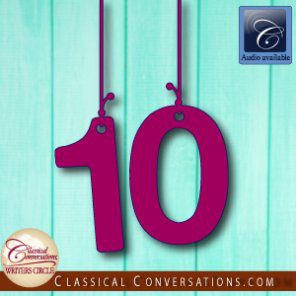- Rest and play! Too many times we are eager to rush our very small children into “school.” Treasure those younger years which fly by. Read lots of good books together, sing silly songs, and take lots of walks and naps. All too soon, your days will be filled with more challenging schoolwork and driving to activities.
- Trust the memory work. We listen to our Foundations memory work four days a week whether we are at the kitchen table, on the swing set, or in the car. It is part of our life routine that does not vary. By the end of the year, even the youngest student has it memorized. There is no magic and no need to supplement with a lot of activities. Just listen, sing, and recite. (Remember that small children learn best through repetition. This is how you taught them to speak.)
- Do not feel pressured to organize everything by the weekly memory work. Some families may choose to coordinate every readaloud and their weekly science and history lessons to the Foundations memory work. If that works for your family, great! I prefer a simpler approach. I have found in our house that it works best when we just loosely follow the science and history for the year. When we encounter something from the weekly sentences or the timeline, the students sit up and take better notice because it is familiar. Those surprise moments of connection are often the most memorable.
- Pace yourself for Memory Master. Memory Master was not designed to put pressure on kids to master all of the material at a very young age or in their first year. Following the example of Leigh Bortins, I have not required my children to test until age ten. Some were ready before that, and I supported and worked with them, but I wanted to be very sensitivity to their readiness.
- Kids like copywork. Parents, it is a strange, but true secret. While we might hate the thought of copying history sentences or math facts or Essentials charts, little ones do not seem to mind. After all, copying our speech patterns is how they learn to speak. Copying our table manners is how they learn to behave at a meal. It is not surprising to find that they best learn to write by copying the words of others. Do not underestimate the vast amount of learning that happens when they sit still, attend to details, and copy a good sentence or paragraph.
- You cannot master Essentials in one year. The adage “it’s a marathon, not a sprint” truly applies to Essentials. The Essentials program is multi-layered and designed for multiple years of study. It is not reasonable to expect that you or your child will master both the grammar and the writing in one year, so set a reasonable goal each year, knowing that you have the next year to fill in the gaps.
- Copying the Essentials charts works. Years ago, I did not really understand the need for copying the Essentials charts each week, so I did not have my oldest child do them. Now, with my third child, we copy the suggested charts each week. Why the change of heart? I have been teaching Henle Second Year Latin for several years, and I see the beauty of knowing the definitions for the noun usages, the adjectives and adverbs, the prepositions, and the verb tenses. These skills are fundamental to really knowing English and thus to the ability to learn Latin.
- Focus on the basics. Each day, we read aloud Scripture, literature, history, and science together. We spend a lot of time on language arts—spelling, grammar, copywork. We spend some time drawing and playing instruments and some time playing in the great outdoors. These activities will prepare them well for more strenuous academics later on. (See my archived webinar on CC Connected “Cultivating Classical Parents” on setting schedules.)
- Train the kids early to take responsibility for their education. I like to establish a routine for the school day. I place my children’s written work in a plastic file box. This is a visual way for them to see their responsibilities for the morning. It also allows them to work independently at a young age if I am working with someone else. Later, in the junior high years, you can transition them to a planner so that they can see their daily school work.
- Do not drop out in the Challenge years. I meet with my Challenge students twice each week. Once to outline the week’s work and once to inspect the work. Also, I want to continue to further my own education, so I choose one subject each year to dig in and learn. One year, it is Latin, another year, it might be a level of high school math or science. It is good for the soul.
Note: For more information about homeschooling through the Challenge years be sure to read Jennifer’s article, “Lessons from a First-Semester Challenge Parent.”




